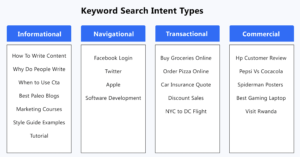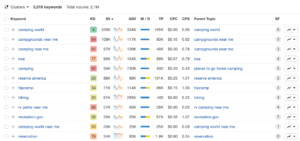If you’re at the early stages in your online marketing or SEO journey, “how do I choose keywords for SEO” is likely one of the biggest questions on your mind.
Keyword research has been a constant in SEO since the beginning, and is arguable the most important part of the entire process.
At its core, SEO is all about ensuring your website or specific web pages show up in the search results for specific keywords. But choosing the right or wrong keywords to target can be the difference between experiencing massive growth and experiencing…nothing at all.
While an effective SEO strategy is a science, combining well-done on page optimisation with efficient site structure and carefully selected backlinks to boost your website’s rankings, keyword research can often be more of an art, as you have to be carefully examine the related keywords to your niche, consider what people may be thinking or looking for when searching each one, and select the one that is most likely to be entered by your ideal customer.
As the UK’s leading Cardiff-based SEO agency, we are able to do this for you to a high standard, and our money back guarantee means this comes at no risk to your business.
If you’d rather figure out how keyword research works and do this for yourself, you’re in the right place, as this post will breakdown everything you know.
Since some of you are probably new to the entire concept of SEO, let’s start with the basics:
What is Keyword Research in SEO?

Keyword research is the process of finding keywords that people regularly enter into search engines, and analysing the potential of using that data for a specific business purpose. Usually, it means finding keywords that are likely to be searched by people that would be interested in your business, with the intent of ranking content or service pages for that keyword. The end result, if done correctly, is people searching those keywords begin to be made aware of your service or product.
SEO professionals analyse many things when judging a keyword, for example:
- Intent: Is the person typing this keyword likely to be looking for what we’re offering? Or could they mean something else?
- Search volume: Is the keyword searched often enough that ranking for it in a search engine results page is likely to bring notable traffic to our website?
- Competition: Is the keyword low competition enough that we can rank for it easily and quickly? If not, are we willing to invest the time and funds necessary to compete?
Intent is a bigger deal than you may at first think, since it will dramatically affect how people react to seeing your website show up in the search results.
For example, there would be no point whatsoever in ranking a top of the line, premium laptop for the keyword “cheap laptops”. People entering that into a search engine are specifically looking for a bargain, and are highly unlikely to be interested. Rank a heavily discounted or second hand laptop in this keyword, however, and you’re likely to get a much better response.
While this is an example designed to be easy to understand, intent can get much more complicated than this, with many words having multiple meanings. It is important to analyse keywords carefully and always recommended to go for the ones that are the closest match.
If you’re ever unsure whether a keyword is a good match, it’s always a good idea to simply enter the keyword in Google to see what’s already ranked, since this will give you a good idea what people searching the term are looking for.
Why is Keyword Research Important?

Keyword research helps you make your SEO strategy more efficient. Just taking a “spray and pray” approach to any keyword that may be relevant is likely to result in a lot of wasted time and effort.
You want to aim for the sweet spot of keywords that are low competition enough to rank for, searched highly enough to actually benefit you once ranked, and that cover topics you can reliably produce great content on.
It also helps you to understand your target audience, what they’re likely to look for in Google, and how closely that matches with what your website is offering them, potentially making you aware of missing services you should be offering, or content gaps you need to cover.
One of the biggest mistakes newcomers to SEO make is simply guessing what they think people would call the service or product they’re offering, essentially making up their own keyword instead of selecting one based on real data. If you base your content strategy on a keyword like that, you may well receive zero additional traffic, even if you produce the best piece of content the internet has ever seen. If nobody is searching for it, Google has nobody to proudly show it to.
When we begin working with newly onboarded clients, keyword research is usually the first task we carry out, since it tells us how many people search for what the client is offering, what they tend to search, and this is information that can inform every other task and strategy going forward.
Benefits of Effective Keyword Research
Carrying out keyword research to a higher standard will offer many benefits, including:
- Increased traffic: The more relevant keywords you rank for, the more traffic your site will receive as a whole. Even if the individual keywords are low search volume, ranking good quality content for more and more of them will put your website in front of more people over time.
- Insight into trends: Conducting regular keyword research will mean you are likely to be made aware earlier when a new relevant keyword starts being searched by someone, or when an existing keyword is increasing or decreasing in search volume. Using this knowledge intelligently will allow you to get content in front of even more people, potentially even ranking for keywords that are growing in demand before they become too competitive.
- Increased customer base: If you provide the right type of content that appeals to the right audience, and put effective calls to action in it, then you will be grabbing a certain percentage of your traffic and adding those people to your customer journey. Once this is done effectively, it will compound over time as you add more and more content and overall site traffic grows.
Search Intent

As an SEO professional, or someone doing their own internal SEO, search intent is likely the most important area for you to understand.
It’s not just the keyword itself you need to get your head around – it’s why somebody would be searching that keyword and what they’re hoping to find.
The content that you’re trying to rank has to be the perfect answer, and solve the problem of the person searching – otherwise, it’s useless and unlikely to succeed.
Think about this post – you probably got here by searching something keyword research related. If you had been searching for a car showroom, would you have read this far into the post?
How to Choose Keywords for SEO
When it comes to actually conducting keyword research, how do you compare and judge the keywords?
We’ll take you through some basic steps to help you understand the process more easily.
Step 1: Find a tool for checking on keywords

To start this off, you’ll need a way to check Google keyword search data. The most reliable and effective way for SEO agencies to do this is to use a software tool called AHrefs. This is also the most expensive tool for this purpose, however, and can only be recommended for larger businesses who can easily afford it.
For those with a tighter budget, there are other great tools out there such as SEMrush and Moz. These are mostly less advanced than AHrefs but are still excellent tools that provide accurate data. Most companies that don’t want to shell out for AHrefs monthly price will be more than happy with these.
Lastly, if you’re a cash strapped freelancer or a very small company, you may struggle to pay for a tool at all in the early days. If this is the case you can actually begin typing queries into Google. The autocomplete feature will finish them off for you with multiple suggestions. By doing this multiple times with different words and letters, you can get a large amount of suggestions for what people commonly search in Google. Unfortunately this method doesn’t come with more in depth metrics given by the tools listed above, such as monthly search volume and keyword difficulty. However, for those without access to such tools, this is a great way to find possible keywords to target.
Step 2: Break down keywords into specific lists or “buckets” based on topic

Once you have a tool or method to find keywords, it’s time to think of all of the main topics you want to cover. There will likely be a main topic that you already have in mind, but consider others that may be worthwhile too.
For example, if we were doing keyword research for our SEO website, clearly we need to cover SEO-specific keywords such as “SEO agency UK”. But it may also be worth covering adjacent topics such as “blogging”, “digital marketing”, “lead generation”, etc.
By breaking these down into separate lists, you’ll have a list of keywords ready to go each time you go to create content around a specific topic.
Step 3: Analyse the intent of the keywords and judge accordingly
You now need to consider what types of content would be best for each group of keywords, in order to match the intent as well as possible.
For example, as an SEO agency, we may see a list of keywords based around services for specific eCommerce platforms. For example, “wordpress SEO” or “webflow SEO services. As an eCommerce SEO agency, it makes sense that we should make pages targeting each of these.
It’s also important to note the differences between keywords like “buy blog posts” which is clearly looking for a service, and keywords like “how to write a blog”, which, while being on the same topic, is clearly looking for information instead.
Since it’s best to tailor your content to exactly what a searcher is looking for, in this position you would be wise to make two different pieces of content entirely. You can make a service page called “buy blog posts”, rank it for that keyword, focus it on pushing your service and making sales. At the same time, make a post called “how to write a blog”, which is purely informational and answers the question in depth, without trying to sell the service too much. You can then use a subtle call to action at the end linking to the service page. The end result is that both content pieces are pointing traffic to the parts of your site that make money, but both are addressing the search intent correctly too.
If you’re ever unsure what the intent of a keyword is, a simple trick is to search it and see what’s already ranking well.
Once you have completed these steps, you will likely have a content plan that will keep you busy for a long time – the key is to get a solid ranking in any keyword that appears to match up with the service, product or content you’re offering, ensuring every searcher that may be interested in your site gets a chance to view it.

